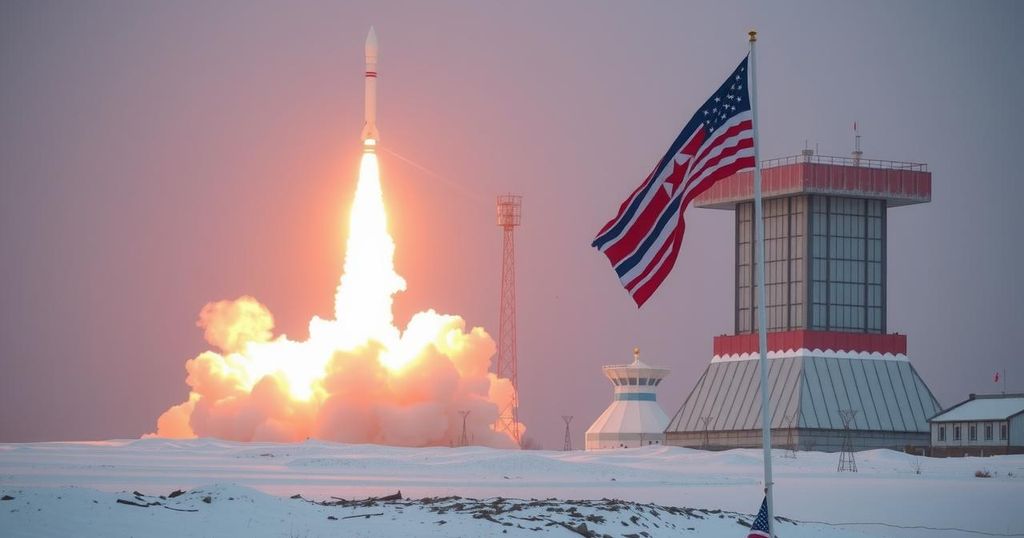North Korea Launches Missile Amid U.S. Warnings on Russian Cooperation

North Korea launched a missile during U.S. Secretary of State Antony Blinken’s visit to South Korea, highlighting concerns over increased cooperation between Pyongyang and Russia. Blinken condemned the action, noting that North Korea is receiving support from Russia amidst its conflict with Ukraine. The visit also addressed South Korea’s internal political turmoil following President Yoon Suk Yeol’s impeachment, while affirming the importance of U.S.-South Korea cooperation.
On Monday, North Korea launched a missile during the visit of U.S. Secretary of State Antony Blinken to South Korea, amidst tensions surrounding collaboration between Pyongyang and Moscow in advanced technologies. Blinken’s visit aimed to bolster South Korea’s cooperative stance with Japan, while a ballistic missile fired by North Korea fell into the sea, traveling approximately 1,100 kilometers (680 miles). In a joint news conference, Blinken and South Korean Foreign Minister Cho Tae-yul condemned the missile launch and expressed concerns over increasing Russian support for North Korea, which could involve sharing advanced military technologies as a reward for the regime’s support in the Ukraine conflict. Blinken warned that North Korea is already receiving military equipment and training from Russia, stressing the implications for global nuclear non-proliferation efforts.
The visit coincided with political turmoil in South Korea, where President Yoon Suk Yeol faced impeachment while being largely confined to his residence. Despite the ongoing internal conflict, Blinken voiced strong support for South Korea’s democratic institutions, underscoring U.S. confidence in the country’s governance. The tensions have escalated amid perceptions that North Korea’s military capabilities are advancing, raising alarm among regional allies, including Japan.
The article also highlights the historical context of U.S.-North Korea relations, noting the contrasting strategies of personal diplomacy under the Trump Administration and the more traditional diplomatic approach of the Biden Administration. Blinken remarked that the previous outreach to North Korea had not yielded positive results, with the regime responding with increasingly provocative actions, including missile tests. He reiterated that political changes within South Korea should not reflect on the stability and direction of the U.S.-South Korean alliance, emphasizing continuity in foreign policy despite challenges.
While attending to these international security concerns, Blinken remained mindful of domestic political sensitivities in South Korea, as he navigated his meetings amid protests highlighting the country’s political divide. His discussions with acting president Choi Sang-mok centered on the importance of maintaining commitments made during prior diplomatic engagements, including the Camp David summit, which sought to strengthen trilateral cooperation between the U.S., South Korea, and Japan.
The article addresses the heightened tensions in East Asia, particularly in relation to North Korea’s missile capabilities and its burgeoning relationship with Russia. It occurred during a diplomatic visit by U.S. Secretary of State Antony Blinken to South Korea, where he highlighted the importance of continued collaboration among allies in response to North Korea’s aggressive military actions. This situation is further complicated by South Korea’s internal political challenges, specifically the impeachment of President Yoon Suk Yeol, which adds to the uncertainty surrounding foreign policy and defense strategies in the region. The historical context of U.S.-North Korea relations, especially in the light of contrasting leadership strategies, is also significant to understanding the current dynamics.
In conclusion, the missile launch by North Korea during Secretary Antony Blinken’s visit to South Korea underscores the precarious security situation in East Asia. As North Korea strengthens its ties with Russia, concerns regarding military advancements and nuclear proliferation mount. Blinken’s reaffirmation of support for South Korea’s democratic institutions amidst political turmoil indicates a consistent U.S. commitment to regional stability and the strengthening of alliances with Japan. Ultimately, the evolving geopolitical landscape necessitates robust cooperation among allies to address the challenges posed by North Korea’s actions.
Original Source: www.dawn.com







